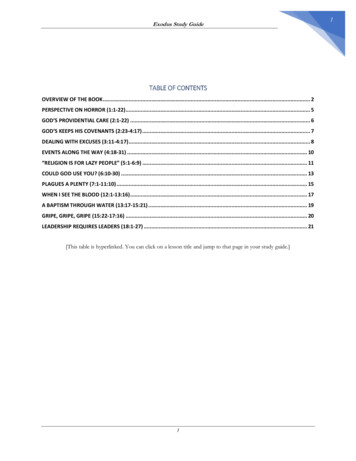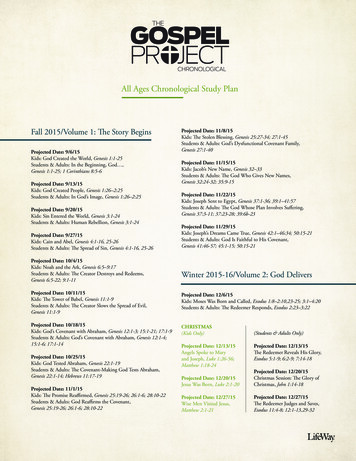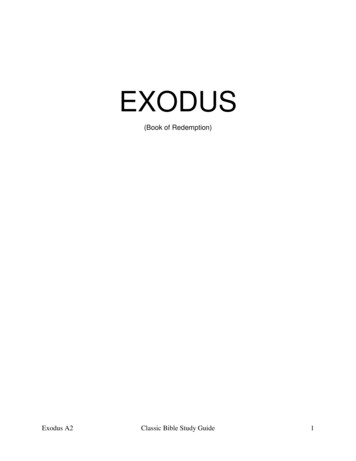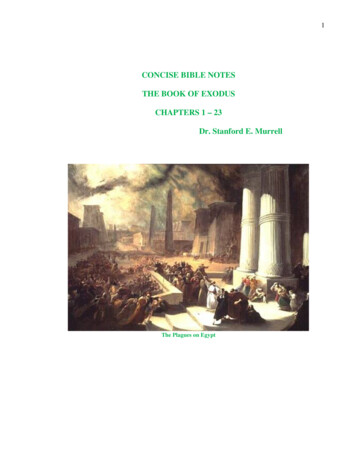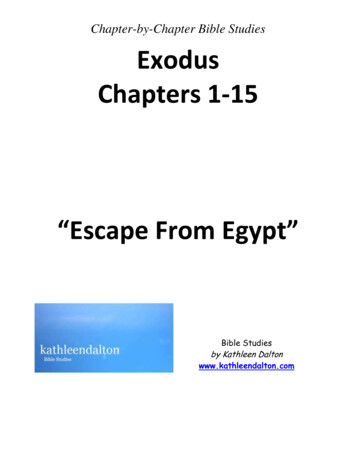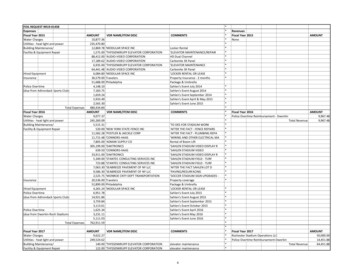
Transcription
THE BOOK OF EXODUSBy E. L. Bynum by Tabernacle Baptist ChurchLESSON 1INTRODUCTION AND ISRAEL IN BONDAGEMemory Verse: Exodus 1:14Lesson: Exodus 1:1-22I. INTRODUCTION TO EXODUSA. The Author.a. The Holy Spirit the author. 2 Peter 1:21 “For the prophecy came not in old time bythe will of man: but holy men of God spake as they were moved by the Holy Ghost.”2 Timothy 3:16 “All scripture is given by inspiration of God, and is profitable fordoctrine, for reproof, for correction, for instruction in righteousness.”b. Moses the human writer.i. The testimony of Exodus – 24:4; 34:27ii. The testimony of Joshua – Joshua 1:7-8iii. The Testimony of Christ – Mark 12:26 “And as touching the dead, that theyrise: have ye not read in the book of Moses, how in the bush God spake untohim, saying, I am the God of Abraham, and the God of Isaac, and the God ofJacob?” Luke 20:37, Luke 24:27, 44 “And beginning at Moses and all theprophets, he expounded unto them in all the scriptures the things concerninghimself. And he said unto them, These are the words which I spake unto you,while I was yet with you, that all things must be fulfilled, which were writtenin the law of Moses, and in the prophets, and in the psalms, concerning me.”B. It’s Place In The Old Testament CJobPsalmsPROPHETICIsaiahJeremiah1
LeviticusNumbersDeuteronomyRuth1 Samuel2 SamuelI Kings2 KingsI Chronicles2 g of chiC. It’s Place In The Pentateuch.a. The first five books were written by Moses and they are called the Pentateuch.b. It is evident that these five books form one narrative. The first Hebrew word ofExodus, Leviticus, Numbers, and Deuteronomy is a conjunction. It is a conjunction,such as our “and,” and is used to connect the narrative to the previous book.c. The first six verses of Exodus tie it effectively to Genesis.D. The Purpose Of Exodus.a. Exodus means “going out” or “the way out,” and thus it describes Israel’s “goingout” of Egypt.b. It is the book of redemption.i. It records the redemption of Israel from Egyptian bondage.ii. It teaches that redemption is necessary, if a person is to have a rightrelationship with a holy God.iii. It teaches that a redeemed people must be constantly cleansed fromdefilement, in order to have fellowship with God.iv. According to W. H. Griffith Thomas, it presents redemption in three aspects.1. The Source and Instrument of Redemption — God through Moses(chapters 1 to 6).2. The Need and Fact of Redemption — Bondage and Passover (chapters7 to 12).3. The Outcome and Object of Redemption — Salvation, Separation, andService (chapters 13 to 40).2
E. The Types of Exodus.a. The person types. Moses and Aaron types of Christ. Hebrews 3:1-2 “Wherefore, holybrethren, partakers of the heavenly calling, consider the Apostle and High Priest ofour profession, Christ Jesus; Who was faithful to him that appointed him, as alsoMoses was faithful in all his house.”b. The place types – Egypt a type of the world and the Red Sea a type of power.c. The thing types – Lamb—redemption by Christ. Herbs—discipline. Pillar—protection.Manna—bread of life, Christ. Rock—Christ. Tabernacle—the presence of God.d. The history type – 1 Corinthians 10:6, 11 “Now these things were our examples, tothe intent we should not lust after evil things, as they also lusted. Now all thesethings happened unto them for ensamples: and they are written for our admonition,upon whom the ends of the world are come.”F. The Outline of Exodus. (J. Sidlow Baxter)a. The Exodus – Chapters 1-18i. Projected – Chapters 1-4ii. Obstructed – Chapters 5-11iii. Effected – Chapters 12-18b. The Law – Chapters 19-24i. Commandments. (Moral).ii. Judgments. (Social).iii. Ordinances. (Religious).c. The Tabernacle – Chapters 25-40i. Designed – Chapters 25-31ii. Delayed – Chapters 32-34iii. Completed – Chapters 35-40II. ISRAEL IN THE LAND OF BONDAGE – Verse 1-22The events between the death of Joseph and the call of Moses and their deliverance fromEgyptian bondage seem to have been around 198 years.A. Israel In Egypt – Verses 1-6a. These verses form a connecting link with Genesis – Verses 1-6b. The names of the Israelite households – Verses 1-5. How did they get there? Theycame with Jacob the carnal man, not Israel the spiritual man.c. The termination of that generation – Verse 63
B. Israel’s Multiplication And The Resulting Bondage – Verses 7-14a. Their great increase – Verse 7; Genesis 12:2; 15:5-6; 22:16-18b. A new king’s evaluation of them – Verses 8-9. He knew not Joseph and he greatlyfeared their might. Why did they stay so long in Egypt?i. They suffered because they mistreated Joseph. Matthew 23:32 “Fill ye upthen the measure of your fathers.” 1 Thessalonians 2:16 “Forbidding us tospeak to the Gentiles that they might be saved, to fill up their sins alway: forthe wrath is come upon them to the uttermost.” Numbers 32:23 “But if yewill not do so, behold, ye have sinned against the LORD: and be sure your sinwill find you out.”ii. The iniquity of the Amorites was not yet full – Genesis 15:16iii. In order for Israel to multiply and be strong – Genesis 46:3iv. That they might gain the good wisdom of Egypt and not the bad. Acts 7:22“And Moses was learned in all the wisdom of the Egyptians, and was mightyin words and in deeds.”c. He did not trust their loyalty – Verse 10. Their number included 600,000 men.d. He determined to suppress their numbers and strength by bondage – Verse 11. Theworld always hates the people of God. John 15:18 “If the world hate you, ye knowthat it hated me before it hated you.” Proverbs 12:10 “A righteous man regardeththe life of his beast: but the tender mercies of the wicked are cruel.”e. The more they were afflicted, the more they increase – Verse 12. Isaiah 46:10“Declaring the end from the beginning, and from ancient times the things that arenot yet done, saying, My counsel shall stand, and I will do all my pleasure.” 1Corinthians 1:19 “For it is written, I will destroy the wisdom of the wise, and willbring to nothing the understanding of the prudent.”f. Their affliction increased without accomplishing the desired results – Verses 13-14C. Pharaoh’s Attempt To Destroy The Males – Verses 15:22a. The midwives ordered to kill the male babies – Verses 15-16.b. The midwives’ disobedience – Verse 17; Proverbs 21:30 “There is no wisdom norunderstanding nor counsel against the LORD.” The king’s command was wrong andthey were right to disobey.i. Jonathan refused to kill David, as his father Saul ordered – 2 Samuel 19:1-5ii. The three Hebrew children disobeyed Nebuchadnezzar when he demandedthey worship the golden image – Daniel 3:18 “But if not, be it known untothee, O king, that we will not serve thy gods, nor worship the golden imagewhich thou hast set up.”4
c. The Apostles disobeyed the Sanhedrin when they commanded them not to preach inthe name of the Lord Jesus – Acts 4:18 “And they called them, and commandedthem not to speak at all nor teach in the name of Jesus.”d. The king rebukes the midwives – Verse 18e. The explanation of the midwives – Verse 19f. God’s blessing on the midwives – Verses 20-21; 1 Samuel 2:30 “but now the LORDsaith, Be it far from me; for them that honour me I will honour.”g. The king’s cruel command to all the people – Verse 22D. Lessons From This Chapter.a. God’s power — increase of Israel.b. God’s purpose preservation of Israel.c. God’s plan severe discipline for Israel.d. If Pharaoh’s plan had been successful, then he would have destroyed Israel andthere could have been no Bible, and no PROMISED SEED. There would have been noChrist. Satan tried this many times, beginning with the murder of Abel – Exodus 14;2 Chronicles 21:4, 17; 22:10; Esther 3:6, 12, 13; Matthew 2:13-18Study Questions1. How many chapters does Exodus contain?2. What is the meaning of Exodus?3. Who is the Author of Exodus?4. Who was the writer?5. If the writer was not Moses, how does this affect the word of Christ?5
LESSON 2GOD PREPARES A DELIVERERMemory Verse: Exodus 2:10Lesson: Exodus 2:1-25Moses is the towering figure of the Old Testament, as Paul was in the New Testament.“The life of Moses presents a series of striking antitheses. He was the child of a slave, and theson of a queen. He was born in a hut, and lived in a palace. He inherited poverty, and enjoyedunlimited wealth. He was the leader of armies, and the keeper of flocks. He was the mightiestof warriors, and the meekest of men. He was educated in the court, and dwelt in the desert. Hehad the wisdom of Egypt, and the faith of a child. He was fitted for the city, and wandered inthe wilderness. He was tempted with the pleasures of sin, and endured the hardships of virtue.He was backward in speech, and talked with God. He had the rod of a shepherd, and the powerof the Infinite. He was a fugitive from Pharaoh, and an ambassador from heaven. He was thegiver of the Law, and the forerunner of grace. He died alone on Mount Moab, and appearedwith Christ in Judea. No man assisted at his funeral, yet God buried him.”—Dr. I. M. HaldemanI. THE EARLY YEARS OF MOSES – Verses 1-10A. His Birth And Providential Concealment – Verses 1-4a. Amram his father, and Jochebed his mother were of the tribe of Levi – Verse 1b. Moses a goodly child – Verse 2; Acts 7:20 “In which time Moses was born, and wasexceeding fair, and nourished up in his father’s house three months.”c. By faith they hid Moses for 3 months – Verse 2. It was faith, not the beauty of thechild, nor a mother’s love that caused them to hide Moses – Hebrews 11:23 “By faithMoses, when he was born, was hid three months of his parents, because they sawhe was a proper child; and they were not afraid of the king’s commandment.”d. The ark prepared – Verse 3. They defied the King in order to do the will of God – Acts5:29 “Then Peter and the other apostles answered and said, We ought to obey Godrather than men.”e. The ark, the child, and the river – Verse 3. This act was contrary to human nature.The natural thing would have been to take him away from the river, since the kinghad demanded that all the male children be thrown in the river.f. Miriam’s concern for her brother – Verse 4; Numbers 26:59B. His Childhood And Providential Training – Verses 5-106
a. The providential finding of the ark – Verse 5. It was no accident that Pharaoh’sdaughter came to the river, and saw the ark and asked for it. Jeremiah 10:23 “OLORD, I know that the way of man is not in himself: it is not in man that walketh todirect his steps.” Romans 8:28 “And we know that all things work together for goodto them that love God, to them who are the called according to his purpose.”b. Her providential compassion – Verse 6. God used the tears of the baby to touch theheart of a princess. Romans 11:36 “For of him, and through him, and to him, are allthings: to whom be glory for ever. Amen.”c. The providential finding of a nurse – Verses 7-8. God used the words of a child toarrange for the baby’s mother to raise him.i. God raised up workers through the birth of babies. We see God working thisway through Isaac, Joseph, Samuel, John the Baptist and Jesus.ii. God uses the weak things to defeat the mighty – 1 Corinthians 1:25-29d. The provision for the mother and child – Verse 9e. His providential adoption – Verse 10. This means he would receive all the wisdomand training of the Egyptians. Acts 7:22 “And Moses was learned in all the wisdom ofthe Egyptians, and was mighty in words and in deeds.” Job 5:13 “He taketh the wisein their own craftiness: and the counsel of the froward is carried headlong.”C. The Typology – Verses 1-10a. The ark a type of Christ. It is the same Hebrew word as the ark of Noah. Thoughbrought to the river (a type of death), he was safe in the ark. So are we safe in Christ.b. The pitch in the ark was a type of the Holy Spirit. It was derived from a kind of oiland oil is a symbol of the Spirit.c. Moses was a type of Christ. Deuteronomy 18:15 “The LORD thy God will raise upunto thee a Prophet from the midst of thee, of thy brethren, like unto me; unto himye shall hearken.”i. Both were Israelites according to the flesh.ii. Both were born when their nation was in bondage. Acts 7:20 “In which timeMoses was born, and was exceeding fair, and nourished up in his father’shouse three months.”iii. Moses was a proper child and exceeding fair – Verse 2. What can we say ofHim who is the fairest of ten thousand? Luke 2:11 “For unto you is born thisday in the city of David a Saviour, which is Christ the Lord.”iv. The king tried to kill them both in infancy – Exodus 1:22; Matthew 2:16 “ThenHerod, when he saw that he was mocked of the wise men, was exceedingwroth, and sent forth, and slew all the children that were in Bethlehem, andin all the coasts thereof, from two years old and under, according to the timewhich he had diligently enquired of the wise men.”7
v. Moses was the son of Jochebed, but become the son of Pharaoh’s daughter.Jesus was the son of God, but became the son of Mary.vi. Moses spent his childhood in Egypt. Jesus spent part of His early childhood inEgypt. Matthew 2:13 “And when they were departed, behold, the angel ofthe Lord appeareth to Joseph in a dream, saying, Arise, and take the youngchild and his mother, and flee into Egypt, and be thou there until I bring theeword: for Herod will seek the young child to destroy him.”D. The Training Of Moses.a. He was trained in all the wisdom of the Egyptians – Acts 7:22. This means that helearned engineering, mathematics, astronomy, and military tactics.b. He was mighty in word and deed. He learned the skills of warfare.II. HIS TIME OF DECISION AND FAILURE – Verses 11-15A. By Faith He Cast His Lot With Israel – Hebrews 11:24-27a. He refused to be called the son of Pharaoh’s daughter. Thus he gave up all claims tothe Egyptian throne. Hebrews 11:24 “By faith Moses, when he was come to years,refused to be called the son of Pharaoh’s daughter.”b. He chose to suffer affliction with his people and refused the pleasures of sin. Whatcharacter he exhibited in his choice. Hebrews 11:25 “Choosing rather to sufferaffliction with the people of God, than to enjoy the pleasures of sin for a season.”c. The satisfaction he enjoyed – Hebrews 11:26 “Esteeming the reproach of Christgreater riches than the treasures in Egypt: for he had respect unto the recompenseof the reward.”d. The faith he employed – Hebrews 11:27 “By faith he forsook Egypt, not fearing thewrath of the king: for he endured, as seeing him who is invisible.”B. Moses Attempts To Deliver His People – Verses 11-12a. At the age of forty he saw the off affliction of his people – Verse 11. He spent thefirst forty years serving the Egyptians. He spent the next forty years being humbledand taught by God. He spent the last forty years working for God and leading Israel.b. He defended an oppressed Hebrew – Acts 7:23-24. He knew he was a Hebrew.c. He slew the Egyptian oppressor – Verse 12d. He supposed that his brethren understood that he was their deliverer – Acts 7:25.The Hebrews could not even get along with each other.e. Moses ran ahead of God, for the time of deliverance was not yet – Genesis 15:16f. He was compassionate. Moses was a meek man – Numbers 12:3g. God would have to be the one to deliver – Exodus 13:38
C. The Results From His Attempt To Deliver – Verses 13-15a. He assumed the role of a peacemaker – Verse 13; Acts 7:26-28b. He was rejected by his people – Verse 14c. He was found out by the king – Verse 15D. The Typology – Verses 11-15a. He came to his own people; they received him not. It was so with Christ – John 1:11b. Early in life he knew he was to be a deliverer – Acts 7:25. At the age of 12, Christknew His Father’s business – Luke 2:49c. Moses, like Jesus, was not ashamed of His brethren – Exodus 2:11; Hebrews 2:11d. Both Moses and Christ renounced wealth to take their place of service with theirpeople – Hebrews 11:24-26; Philippians 2:6-7e. Both were rejected by their brethren – Verse 14; John 1:11III. MOSES IN EXILE FORTY YEARS – Verses 15-25A. Moses Defends The Daughters Of Reuel – Verses 15-20a. Moses defends the oppressed – Verses 15-17. This was a courageous act andrevealed a lot about Moses.b. They declare what Moses had done – Verses 18-19c. Reuel desired to meet him – Verse 20. He had two names. Reuel means “friend ofGod,” and Jethro means “excellence.” – Exodus 3:1B. Moses Marries A Gentile – Verses 21-22a. Moses married Zipporah – Verse 21b. Gershon born – Verse 22C. Israel Suffering In Egypt – Verses 23-25a. Even a king must die – Verse 23. Is it possible that Moses could have been the newking if he had ignored the plight of the Hebrews?b. Israel crying unto the Lord – Verse 23c. God responds to their groans – Verses 24-26D. The Typology – Verses 15-25a. From a prince in Egypt, he was humbled and became a shepherd that he might inthe end save his people. Jesus as the prince of heaven humbled himself and becamethe good shepherd to save the sheep – John 10:11, Philippians 2:5-11b. Moses and Jesus both sat by a well – Verse 15; John 4:4,69
c. Moses helped the daughters of Reuel; Jesus helped the Samaritan woman – John 4:4d. Moses rejected by his brethren takes a Gentile bride – Verse 21. Jesus rejected byHis brethren, is now taking a Gentile bride – Acts 18:5-6; 15:14; Ephesians 5:30-32Study Questions1. Name the parents of Moses.2. Why did they dare to hide Moses?3. Name the sister of Moses?4. Was it accidental or providential that Pharaoh’s daughter found the ark?5. What was the ark a type of?6. What was there about the ark that typified the Holy Spirit?7. Name as many ways as you can, that Moses was a type of Christ.8. The river was a type of?9. Name two passages from the New Testament that throw considerable light upon the lifeof Moses.10. State the kind of training Moses received in Egypt.11. Stephen said that Moses was in and in .12. What great word describes Moses reason for siding with Israel?13. What age was he when he viewed their affliction?14. What did he do to the Egyptian oppressor?15. What did he suppose that his brethren would understand?16. How was he received by his brethren?17. Where did Moses go and dwell?18. What was the name and occupation of Moses’ father-in-law?19. What was the name of Moses’ wife?10
LESSON 3THE BURNING BUSH AND MOSES’ CALLMemory Verse: Exodus 3:14Lesson: Exodus 3:1-22Although Moses was learned in all the wisdom of the Egyptians and was mighty in words anddeeds, nevertheless, he was not ready to lead Israel out of Egypt. He spent 40 years in thedesert keeping the flock, before he was put in charge of God’s flock. Acts 7:23 “And when hewas full forty years old, it came into his heart to visit his brethren the children of Israel.” Exodus7:7. In the desert he had time for meditation and communion with God. There was a interval offorty years between chapters two and three. Isaiah 28:16 “ he that believeth shall not makehaste.” God does not call the lazy and indolent. He calls busy people. David – 1 Samuel 17:20;Elisha, 1 Kings 19:19-21; Simon, Andrew, James and John – Mark 1:16-20; and Matthew –Matthew 9:9.I. THE CALL OF MOSES – Verses 1-10A. The Vision Of The Burning Bush – Verses 1-3a. Moses the shepherd – Verse 1. Sometimes a person must go to the backside of thedesert to be taught to depend on God.b. As a shepherd, he is a type of Christ – John 10:11 “I am the good shepherd: the goodshepherd giveth his life for the sheep.”i. As a “good shepherd” he leads his flock.ii. He led them to Horeb the “mountain of God.”c. HOREB (ho’reb, drought, desert), the mountain where Moses received hiscommission (Exodus 3:1); where he brought water out of the rock (Exodus 17:6);where the people stripped off their ornaments in token of repentance (Exodus 33:6);eleven days’ journey from Kadesh-barnea (Deuteronomy 1:2); mentioned also inDeuteronomy 1:6, 19; 4:10,15; 5:2; 9:8; 1 Kings 8:9; 2 Chronicles 5:10; Psalm 106:19;Malachi 4:4, in connection with the journeys of Israel, the giving of the law, andevents of the year in which the Israelites stayed nearby. Elijah fled hither (1 Kings19:8). It is geographically indistinguishable from Sinai. —The Zondervan Pictoriald. The burning bush – Verse 2. The bush was not consumed, because God was in it.This was a theophanic appearance of the Lord Jesus Christ. After all, the angel iscalled Lord and God in verse 4. The bush was a type of Israel (Deuteronomy 4:20),and of the Church (Matthew 16:18) (or anything that God is in), preserved by Hispresence. Hebrews 12:29 “For our God is a consuming fire.” Any old bush will do if11
God is in it – Isaiah 43:1-2 “But now thus saith the LORD that created thee, O Jacob,and he that formed thee, O Israel, Fear not: for I have redeemed thee, I have calledthee by thy name; thou art mine. When thou passest through the waters, I will bewith thee; and through the rivers, they shall not overflow thee: when thou walkestthrough the fire, thou shalt not be burned; neither shall the flame kindle upon thee.”e. Moses turns aside to see – Verse 3. Only God could cause the bush to burn and notyet be consumed.B. The Voice Of God From The Burning Bush – Verses 4-6a. It was the LORD (God the Son) in the bush – Verse 4. The word for bush is only foundin one other passage – Deuteronomy 33:16. The word for dwelt in that verse, is theHebrew “shakan,” which leads us to the Shekinah glory, which Moses saw.b. The LORD saw. God called – Verse 4. This utterly shatters the Elohim-Jehovah twoGod Theory of the liberals. Here He is called both Jehovah (LORD) and Elohim (God)in the same verse.c. The double call, “Moses, Moses,” implies urgency – Verse 4; 1 Samuel 3:10d. The majesty and holiness of God – Verse 5; Exodus 19:11,13. Too often God istreated as if He were a man, but He is the Holy God and should be treated with greatfear and reverence – Isaiah 6:3 “And one cried unto another, and said, Holy, holy,holy, is the LORD of hosts: the whole earth is full of his glory.” Revelation 4:8 “Holy,holy, holy, Lord God Almighty, which was, and is, and is to come.” Revelation 15:3-4e. God identifies Himself – Verse 6C. The Victory Promised – Verses 7-10a. The Lord’s Fourfold Compassion – Verses 7-8. In our day the world (Egypt) hasmultitudes in the bondage of immorality, drink, drugs, and other lusts of the flesh.They desperately need deliverance and only God can give it – 2 Timothy 2:26 “Andthat they may recover themselves out of the snare of the devil, who are takencaptive by him at his will.”i. He had seen their affliction. He is concerned.ii. He had heard their cry. He is compassionate.iii. He knew their sorrows. He is charitable.iv. He came down to deliver. He is considerate.b. The Lord’s threefold purpose – Verse 8. Notice that God is positive what He will do.There are no “ifs,” “maybes,” or “perhaps” with God.i. To deliver them out of the hand of the Egyptians.ii. To bring them out of Egypt.iii. To bring them into Canaan.12
c. The call of Moses – Verses 9-10. God always finishes what He sets out to do. Mosesmust have been surprised that God would call him; after all he had failed indelivering them some 40 years before.II. THE CONVINCING OF MOSES – Verses 11-14A. The Unwillingness of Moses – Verses 11, 13a. Reluctant because of self – Verse 11. How different than the Moses of Forty years inthe past. Then he was brash, bold, and willing. Before he had been like a horserushing ahead of God. Now he is like a stubborn mule – Psalm 32:9 “Be ye not as thehorse, or as the mule, which have no understanding: whose mouth must be held inwith bit and bridle, lest they come near unto thee.”b. Reluctant because of his lack of knowledge – Verse 13. He felt that Israel would havequestions he could not answer.B. The Willingness Of God – Verses 12, 14a. He was willing to go with Moses and to give him a sign – Verse 12. God’s presencewas all he needed, for it would be God that would do the work. Moses was only aninstrument in the hand of God – Joshua 1:5 “There shall not any man be able tostand before thee all the days of thy life: as I was with Moses, so I will be with thee: Iwill not fail thee, nor forsake thee.” Isaiah 41:10 “Fear thou not; for I am with thee:be not dismayed; for I am thy God: I will strengthen thee; yea, I will help thee; yea, Iwill uphold thee with the right hand of my righteousness.” Romans 8:31 “What shallwe then say to these things? If God be for us, who can be against us?” Philippians4:13 “I can do all things through Christ which strengtheneth me.”b. He was willing to reveal Himself as the “I AM.” – Verse 14. Jesus Christ revealed thatHe was the “I am.” John 6:35, 48 “And Jesus said unto them, I am the bread of life:he that cometh to me shall never hunger; and he that believeth on me shall neverthirst. I am that bread of life.” 8:12, 58 “Then spake Jesus again unto them, saying, Iam the light of the world: he that followeth me shall not walk in darkness, but shallhave the light of life. Jesus said unto them, Verily, verily, I say unto you, BeforeAbraham was, I am.” John 10:11 “I am the good shepherd: the good shepherd givethhis life for the sheep.” John 15:1 “I am the true vine, and my Father is thehusbandman.” Revelation 1:8 “I am Alpha and Omega, the beginning and theending, saith the Lord, which is, and which was, and which is to come, the Almighty.”III. THE COMMISSION OF MOSES – Verses 15-22A. What Moses Was Commissioned To Do – Verses 15-18a. Tell them that the unchanging God had sent him – Verse 15b. Gather the elders of Israel – Verse 1613
c. Give to the elders God’s message – Verse 17d. Deliver a message to the king – Verse 18e. The promise to Moses – Verse 18; Isaiah 46:10 “My counsel shall stand, and I will doall my pleasure.”B. What God Promised To Do – Verses 19-22a. He promised to make Pharaoh give up Israel – Verses 19-20b. He promised to make the Egyptians give up wealth to Israel – Verses 21-22Study Questions1. What occupation was Moses following?2. Why was the bush not consumed?3. Who spoke from the burning bush?4. How long of time intervened between chapters 2 and 3?5. When God said “Moses, Moses,” what did that imply?6. Why was Moses to remove his shoes?7. How is “Elohim” translated into English? How is “Jehovah” translated into English?8. How does the Scriptures reveal that God was acquainted with Israel’s problem?9. What did God say He would do for Israel?10. Why was Moses reluctant to go back to Egypt?11. How did Moses know that victory was certain?12. Who was Moses to say had sent him?13. How did Moses know that Israel would hear him?14. What were the Israelites suppose to do before they left Egypt?15. How could their doing this be right?14
LESSON 4OVERCOMING MOSES’ OBJECTIONSMemory Verse: Exodus 4:12Lesson: Exodus 4:1-31I. MOSES’ OBJECTION AND GOD’S ANSWER – Verses 1-17A. Unbelief Overcome By Signs – Verses 1-9a. Moses predicts the unbelief of Israel – Verse 1. In reality Moses speaks from thestandpoint of his own unbelief. The Jews require a sign – 1 Corinthians 1:22 “For theJews require a sign, and the Greeks seek after wisdom.”b. The rod sign revealed – Verses 2-4c. The purpose of the sign that they may believe – Verse 5d. The meaning of the sign – Verses 2-5i. It shows that God can use anything He pleases, even a shepherd’s rod.ii. The rod was a symbol of God’s grace as a support – Psalm 23:4 “Yea, though Iwalk through the valley of the shadow of death, I will fear no evil: for thouart with me; thy rod and thy staff they comfort me.” Lean upon it for supportis fine, but cast it down and it becomes a serpent, which is a type of Satan.iii. The rod is a symbol of governmental authority and reign. Thus it showedGod’s approval of Moses & ultimately of Christ – Psalm 2:9 “Thou shalt breakthem with a rod of iron; thou shalt dash them in pieces like a potter’s vessel.”Revelation 2:27 “And he shall rule them with a rod of iron; as the vessels of apotter shall they be broken to shivers: even as I received of my Father.iv. It shows that only divine power can control Satan – 2 Timothy 2:26 “And thatthey may recover themselves out of the snare of the devil, who are takencaptive by him at his will.” Egypt (type of the world) cannot defeat God. Theserpent was worshipped in Egypt and was an emblem of the goddess Ranno.e. The leprous hand sign, and its meaning – Verses 6-8i. The hand represents the power of man, and is shown to be helpless withoutthe power of God.ii. The hand speaks of energy and works. The leprous hand is incapable ofworking for God until it is cleansed.15
iii. Moses is here representative of the whole Hebrew nation. They are alldefiled and in need of cleansing.iv. Moses prefigures Christ who had no sin, did no sin, and knew no sin –Hebrews 4:15 “For we have not an high priest which cannot be touched withthe feeling of our infirmities; but was in all points tempted like as we are, yetwithout sin.” 1 Peter 2:22 “Who did no sin, neither was guile found in hismouth. He bare our sins and became sin for us.” 2 Corinthians 5:21 “For hehath made him to be sin for us, who knew no sin; that we might be made therighteousness of God in him.”v. The hand that holds the rod of God’s power, must be cleansed, and must becontrolled by a new heart – Isaiah 52:11 “Depart ye, depart ye, go ye outfrom thence, touch no unclean thing; go ye out of the midst of her; be yeclean, that bear the vessels of the LORD.”f. The sign and meaning of the water turning to blood – Verse 9i. It reveals the consequences of rejecting the first two signs.ii. Blood here speaks of judgment upon sin.iii. Since the Egyptians worshiped the Nile River, it was a symbol of judgmentupon their gods and worship.B. Unbelief Overcome By Giving A Spokesman – Verses 10-17a. Moses pleads lack of eloquence as an excuse – Verse 10. This does not square withActs 7:22 “And Moses was learned in al
The Outline of Exodus. (J. Sidlow Baxter) a. The Exodus - Chapters 1-18 i. Projected - Chapters 1-4 ii. Obstructed - Chapters 5-11 iii. Effected - Chapters 12-18 b. The Law - Chapters 19-24 i. Commandments. (Moral). ii. Judgments. (Social). iii. Ordinances. (Religious). c. The Tabernacle - Chapters 25-40 .



